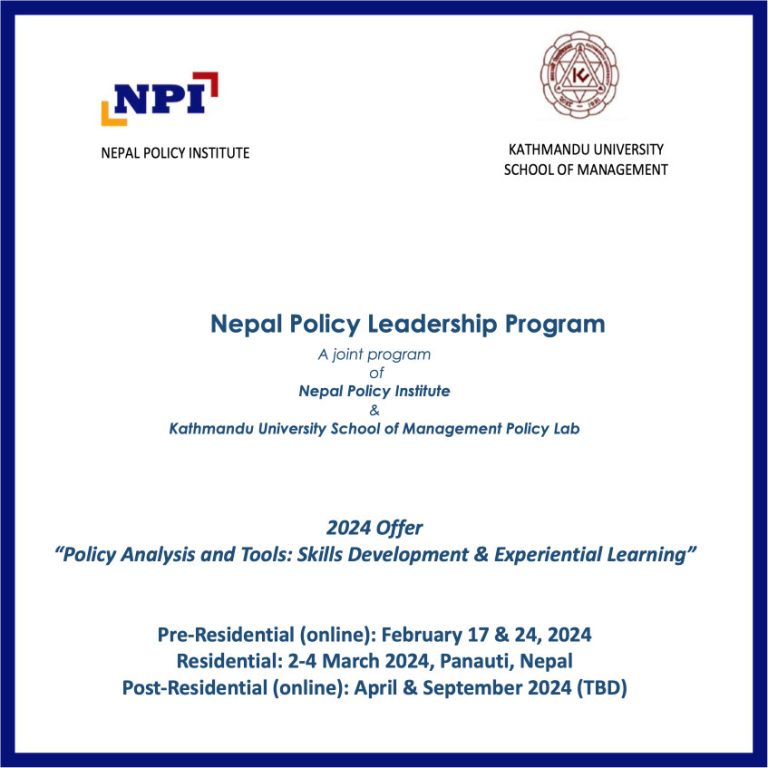
Nepal Policy Leadership Program
Policy leadership is crucial for driving a country’s progress, as it involves identifying problems, seeking sustainable solutions, and making informed decisions that
We are an international, independent, and non-partisan think-tank and a knowledge-platform dedicated to the people-centred and sustainable development of Nepal and Nepali people, including diaspora Nepali
NPI is a forum of Nepal origin public policy scholars, researchers, practitioners, experts and consultants across the globe, in collaboration and partnership with people and institutions anywhere and everywhere working in the interest of Nepal and Nepali people, including diaspora Nepali. This is a borderless organisation working and connecting people in the cloud, land and the space in between.
We are registered as a not-for-profit, non-party political, non-religious, and non-governmental Stichting (foundation) in The Hague, The Netherlands. NPI’s field presence in Nepal is also now formalized in its registration under the Companies Act 2006.
Our mission is to provide and promote the knowledge and public discourse about public policy for prosperity, peace and sustainable development of Nepal and Nepali people anywhere and everywhere.
Carry out public policy research, analysis, impact assessment related to people-centered and sustainable development of Nepal and recommend options and alternatives;
Provide open and accessible platforms for wider public policy learning, sharing, networking, debates and discourse among government non-profit or private sector public policy experts, academia, advocates, consultants and practitioners in Nepal and globally;
Engage and mobilize Nepali diaspora, in general and Nepali diaspora academics, public intellectuals and students, in particular in fulfilling the Foundation’s mission and objectives;
Positively inform and engage people in Nepal and Nepali diaspora abroad about public policy concerns, discourse and alternatives; and
Participate in and contribute to the growth and development of public policy think-tank communities and ecosystem in Nepal.
Help build capacity of government officials and others at all levels of government on public policy analysis and associated areas of research, practice, and inquiry.

Policy leadership is crucial for driving a country’s progress, as it involves identifying problems, seeking sustainable solutions, and making informed decisions that

Nepal Policy Institute is organizing Policy Dialogue Series on “Women at the Forefront of Policy Making”. The webinar will be held on Monday, 22 May 2023 7:00 PM – 8:30 PM (Nepal Standard Time).

Nepal Policy Institute is organizing Policy Dialogue Series on “Public-Private Partnership (PPP) in School Education in Nepal.” The webinar will be held on Thursday, 24 March 2022 (10 Chaitra 2078), 2:00 PM – 3:30 PM (Nepal Standard Time).

This book looks at several critical policy issues that dominate the fiscal federalism debate in Nepal, and argues that given several Type 1 risks evident on the ground, the reform space in this arena is indeed constrained.
०७ चैत २०७८, काठमाडौं: संविधानले सबै नागरिकको मताधिकार सुनिश्चित गरेको छ। तर, विदेशमा बस्ने २२ लाख बढी नेपाली भने स्थानीय निर्वाचनमा मताधिकारबाट वञ्चित हुने भएका छन्। विश्वले सूचना र प्रविधिको क्षेत्रमा चमत्कार गरिसके पनि निर्वाचन आयोगले विदेशमा रहेका नेपालीलाई मतदान गर्ने प्रविधिको विकास गर्न नसक्दा उनीहरू वञ्चित हुन लागेका हुन्।
